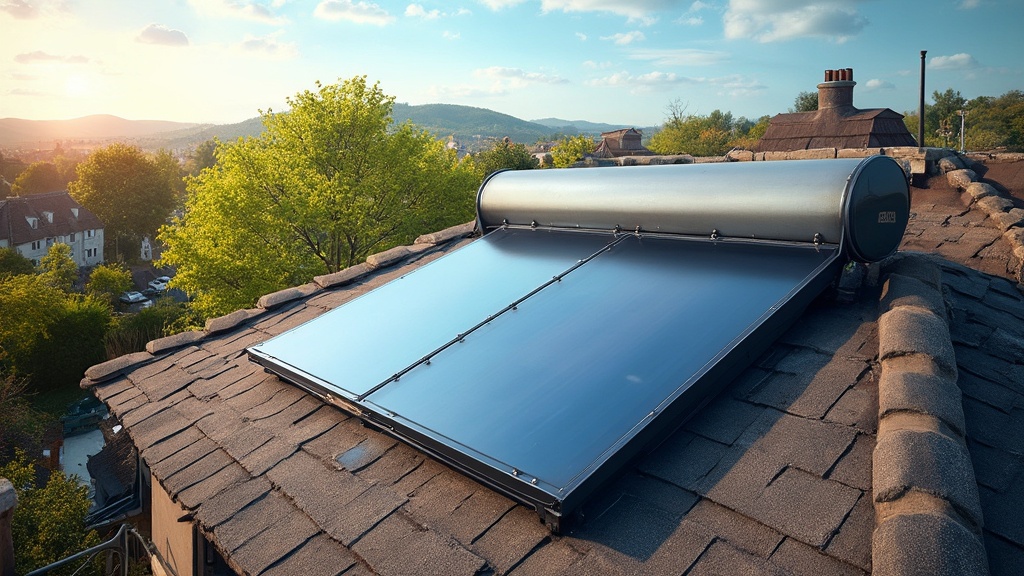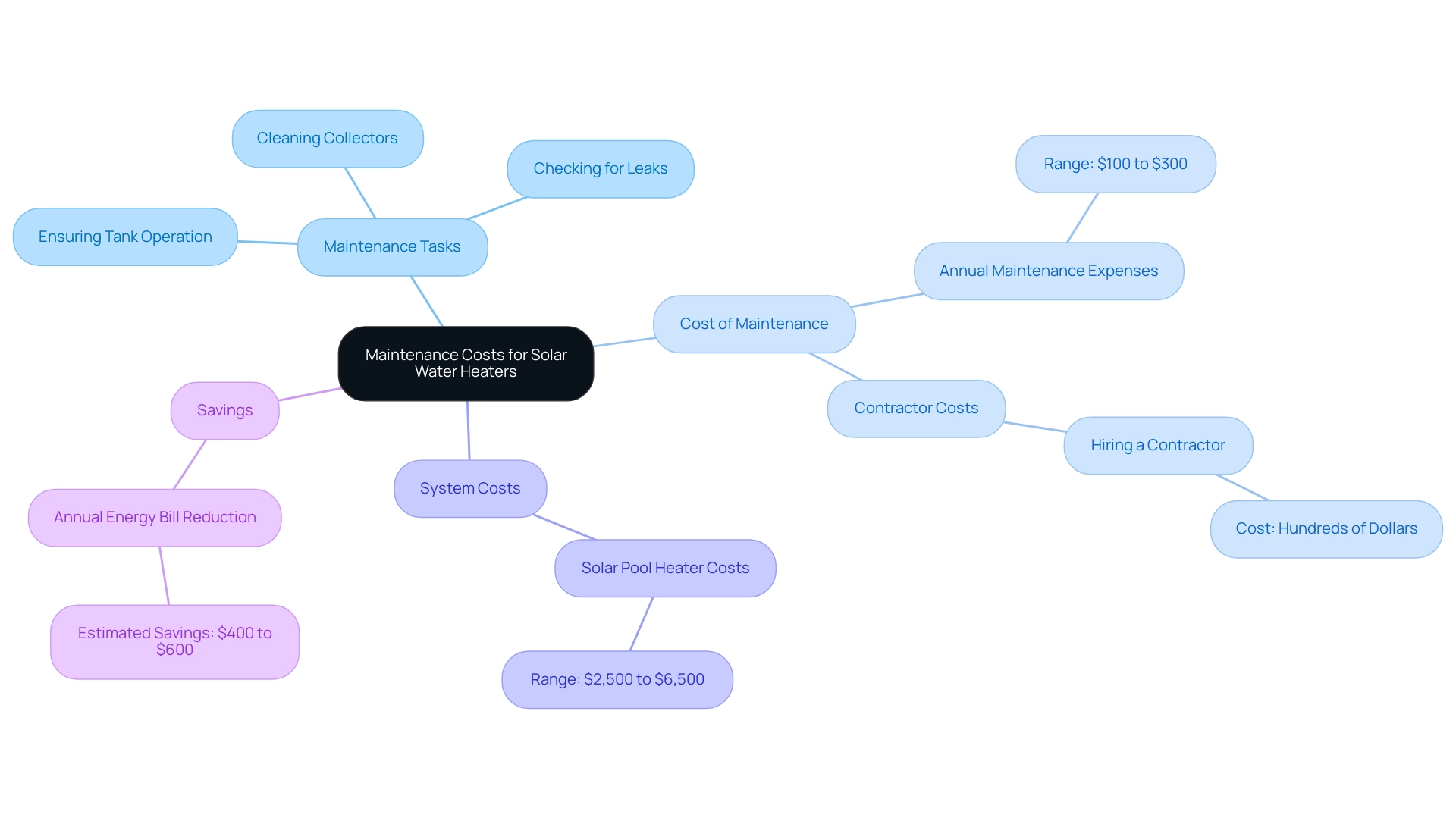Introduction
As the world shifts towards more sustainable living, many homeowners are exploring the benefits of solar water heaters. These innovative systems not only promise significant savings on energy bills but also contribute to a greener planet. However, understanding the costs associated with installation and maintenance can be a bit overwhelming.
From the initial investment to potential savings and available incentives, there’s a lot to consider. This article breaks down everything homeowners need to know about solar water heaters, including:
- The types available
- Factors influencing installation costs
- The financial incentives that make this eco-friendly choice even more appealing
With the right information, transitioning to solar water heating can become a smart and rewarding decision for any household.
Understanding the Installation Costs of Solar Water Heaters
Installing a renewable heating system can indeed feel like a significant step, but it’s a valuable investment for eco-conscious homeowners seeking to adopt sustainable living. Generally, you can anticipate the overall installation expenses, including the cost of solar water heater, to range from $3,000 to $7,000, with active water heaters priced between $2,000 and $4,000. This range largely depends on factors like the type of setup you choose, how complex the installation is, and local labor rates.
Essential elements leading to these expenses consist of:
- Collectors
- Storage tanks
- Labor for installation
As Botelho notes, ‘Indirect-fired heaters use a coil inside the tank that connects to a boiler with piping, similar to a heating zone,’ highlighting the intricacies involved in the installation process. Don’t forget to consider possible additional expenses, such as permits, inspections, and any upgrades needed for your current plumbing or electrical setups.
As you plan your budget, keep in mind that potential tax credits and rebates can substantially lower the cost of a solar water heater. According to a case study from Southern California, after tax rebates, the cost of solar water heater systems can vary from $1,000 to $9,500. Significantly, households of 4-5 individuals can lower their heating energy expenses by 50-80% by considering the cost of solar water heater, with an average payback period of 2-5 years.
Furthermore, government initiatives may offer extra incentives for homeowners, making renewable heating not just an eco-friendly option, but an attractive and economical one, particularly given its long-term sustainability and considerable effect on decreasing your carbon footprint. These diverse applications and substantial savings associated with heating technologies make them an appealing choice for various residential scenarios.
Exploring Different Types of Solar Water Heaters and Their Costs
When it comes to solar heating devices, eco-conscious homeowners typically encounter two main varieties: active and passive types. The cost of solar water heater for active setups, which include direct and indirect circulation arrangements, typically ranges from $4,000 to $8,000. These setups employ pumps to move liquid, leading to improved efficiency and dependability.
In contrast, passive setups have a lower cost of solar water heater, making them a more budget-friendly option, costing between $3,000 and $5,000. They depend on natural convection for water movement, which can make them less efficient, particularly in colder climates. While passive setups are easier on the wallet, they might not suit every location due to their reliance on favorable weather conditions.
It’s also important to consider that integral collector storage solutions can weigh over 400 pounds, impacting installation choices. Moreover, comprehending elements such as heat exchangers and heat-transfer fluids is crucial for assessing the efficiency of heating solutions. Heat exchangers play an essential role in transferring heat from the collector to the supply, enhancing overall efficiency.
When choosing a heating solution for sunlight, it’s essential to take into account not only the buying price but also the cost of solar water heater installation and maintenance expenses, which can differ greatly among various solutions and models. Consulting manufacturers and qualified contractors is recommended for accurately estimating these costs, ensuring a comprehensive understanding of the total investment required for water heating systems. Real-life case studies have demonstrated that homeowners can attain substantial savings on their energy expenses while also lowering their carbon footprint by adopting heating solutions using sunlight.
Therefore, it’s essential for homeowners to evaluate their specific needs, local climate, and budget before making a decision. This choice not only affects the initial investment but also plays a significant role in long-term energy savings and environmental impact. As noted by Gabrielė Ptašinskaitė-Mačiulė, ‘Locational Marginal Pricing (LMP) data assists developers in predicting profitability, reducing financial risk, and optimizing site selection,’ so doing your homework is just as vital for homeowners considering their energy options.
Factors Influencing Solar Water Heater Installation Costs
When it involves setting up a water heating system powered by the sun, several key elements can greatly influence the cost of solar water heater. One of the most crucial elements is your geographic location. Regions with elevated labor expenses or stricter regulations often observe increased installation charges.
For example, keeping a renewable fraction below specific limits—0.3 from April through September and 0.5 for the full year—can significantly impact overall performance and efficiency. A seasonal energy fraction greater than 50% ensures optimal efficiency, highlighting how your location can influence installation costs. Additionally, consider the type and condition of your roof; if it needs reinforcement or is tough to access, you might face higher labor charges.
The complexity of the setup also plays a role—those requiring intricate plumbing or electrical work generally come at a steeper price. It’s important to note the two main types of heating systems:
- Active systems, which use pumps and controls to circulate heat.
- Passive systems, which rely on natural heat circulation.
Combining heat heaters with heat exchangers can further enhance energy efficiency, maximizing your savings.
Real-world examples, like the Pay-As-You-Go Solar PV Systems in East and West Africa, showcase how geographic influences can shape pricing and accessibility. So, as you plan your heating system installation, think carefully about these factors—they can significantly impact the cost of solar water heater and your final bill, helping you budget accordingly, all while contributing to a sustainable, eco-friendly lifestyle. Furthermore, embracing thermal heaters can result in substantial decreases in utility expenses, strengthening the financial benefits of transitioning.
Potential Savings and Incentives for Solar Water Heaters
Installing water heaters can lead to significant savings on energy expenses, with numerous eco-conscious homeowners finding that the cost of solar water heater systems allows them to recoup their initial investment within 5 to 10 years. For a typical household using 2,634 kWh yearly, the savings from photovoltaic energy can amount to around $274.46 annually, based on a rate of $0.1042 per kWh. The financial landscape is further enhanced by a variety of incentives designed to ease the upfront costs, such as the federal Investment Tax Credit (ITC), which allows homeowners to deduct a significant percentage of their installation expenses—typically ranging from $2,000 to $5,000—from their federal taxes.
This makes thermal liquid heating an even more appealing choice. Additionally, many states and local governments offer rebates and grants that can further reduce financial barriers. By utilizing these incentives, homeowners can convert renewable heating into a feasible, economical, and environmentally friendly option.
It’s also crucial to note that heating devices using sunlight are one of six categories of domestic hot-liquid production methods, which also include:
- Wood
- Oil/Gas
- Electric
- Heat Pump
- Instantaneous Technologies
Each system presents its own operational costs, which may include the cost of solar water heater and environmental considerations. Furthermore, integrating water heaters powered by the sun with other renewable energy solutions, such as Tesla home chargers and energy panels, can enhance overall energy efficiency.
Homeowners can also explore battery options to store excess energy for later use, maximizing savings and sustainability. As Rishikesh Kumar aptly puts it, ‘Choose Varistor Solar™ for a greener and more energy-efficient future.’ With the right support and incentives, adopting renewable energy technology can pave the way for lasting savings and significant environmental benefits.
Maintenance Costs and Considerations for Solar Water Heaters
While photovoltaic water heaters are generally low-maintenance, it’s wise for homeowners to budget for occasional upkeep to ensure optimal performance. Regular maintenance tasks include:
- Checking for leaks
- Cleaning the collectors to prevent dust and debris buildup
- Ensuring the storage tank operates smoothly
Depending on the system type and any unforeseen problems, maintenance expenses can vary from $100 to $300 each year.
Timothy Moore proposes, “If we analyze the expenses further, you can gain a clearer understanding of the cost of solar water heater types as well as replacement components.” It’s also important to note that the cost of solar water heater systems, which include pool heaters powered by the sun, can range from $2,500 to $6,500, representing a significant investment. A case study titled ‘Solar Pool Heater Costs‘ highlights how these setups utilize existing pool pumps to circulate water through roof-mounted collectors, effectively warming the pool water.
Moreover, hiring a solar thermal contractor for maintenance could cost hundreds of dollars, which emphasizes the cost of solar water heater upkeep. Investing in routine maintenance not only enhances the lifespan of the setup but also maximizes efficiency, leading to greater energy savings in the long run. Homeowners can expect a reduction in energy bills, with the Department of Energy estimating annual savings between $400 to $600.
For indirect setups, purging the collector or hot fluid loop every 3 to 5 years is advised to sustain optimal performance. By proactively maintaining their systems, homeowners can keep their solar water heaters running efficiently while contributing to a more sustainable environment and enjoying the financial benefits of reduced energy bills.
Conclusion
Transitioning to solar water heating presents a compelling opportunity for homeowners seeking to embrace sustainability while enjoying financial benefits. Understanding the initial installation costs, which can range from $3,000 to $7,000 depending on the system type and complexity, is crucial for effective budgeting. Active systems may offer enhanced efficiency, but passive systems provide a more affordable entry point for those mindful of expenses.
Moreover, various factors, such as local labor costs and roof conditions, can significantly influence installation expenses. By carefully evaluating these elements, homeowners can make informed decisions that align with their energy needs and financial goals. The potential savings on energy bills, coupled with incentives like the federal Investment Tax Credit, further enhance the appeal of solar water heaters, making them a financially sound investment.
While maintenance is generally low-cost, setting aside a budget for routine upkeep ensures optimal performance and longevity of the system. The combined effect of reduced energy bills and the positive environmental impact of solar water heating makes it an attractive choice for eco-conscious homeowners. Embracing this technology not only contributes to a greener planet but also paves the way for significant savings in the long run. Now is the perfect time to consider making the switch to solar water heating, transforming both your home and your environmental footprint for the better.



